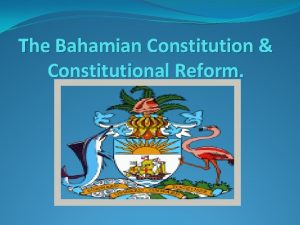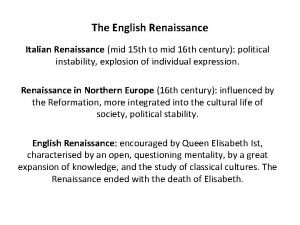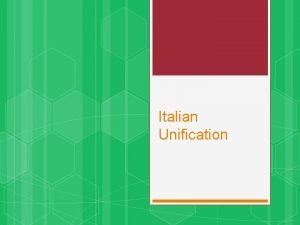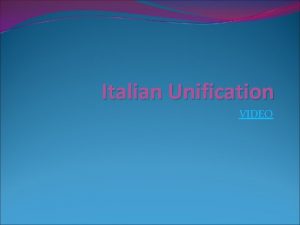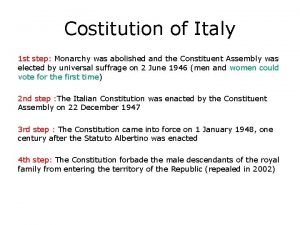ENGLISH CONSTITUTION VS ITALIAN CONSTITUTION The English costitution











- Slides: 11

ENGLISH CONSTITUTION VS ITALIAN CONSTITUTION The English costitution The Italian costitution

THE ENGLISH CONSTITUTION

Definition • The English Constitution is a book written in 1867 by Walter Bagehot • The book became a standard work which was translated into several languages

Characteristics It defined the fold: • The right to rights and role of a monarch, a government as threebe consulted advise warn

Structure The English constitution is organized into two components: the Dignified (that symbolic part) the Efficient (the way things actually work and get done).

THE ITALIAN COSTITUTION

The Italian Costitution 1 st step: Monarchy was abolished and the Constituent Assembly was elected by universal suffrage on 2 June 1946 (men and women could vote for the first time) 2 nd step : The Italian Constitution was enacted by the Constituent Assembly on 22 December 1947 3 rd step : The Constitution came into force on 1 January 1948, one century after the Statuto Albertino was enacted 4 th step: The Constitution forbade the male descendants of the royal family from entering the territory of the Republic (repealed in 2002)

Content of the Italian Constitution The constitutional compromise: The three tendencies(solidaristic christian democratic, liberal and left-wing) that enlivened debate in the Assembly, wanted to to insert something reflecting their values in the Constitution. EXAMPLES 1)marriage and the family solidaristic christian democratic 2) workers' rights communism and socialism They reached an agreement on one point: • NO DICTATOR SHOULD HAVE TYRANNIZED ON THE COUNTRY

STRUCTURE The Constitution is composed of 139 articles (four of which were later abrogated) and arranged into three main parts Principi Fondamentali, or Fundamental Principles (articles 1– 12) Part I (articles 13– 54) concerning the Diritti e Doveri dei Cittadini, or Rights and Duties of Citizens Part II (articles 55– 139) the Ordinamento della Repubblica, or Organisation of the Republic followed by 18 Disposizioni transitorie e finali, or Transitory and Final Provisions.

Articles 13– 28 the Italian equivalent of a bill of rights in common law jurisdictions. Power is divided among the executive the legislative and judicial branches The Constitution establishes the balancing and interaction of these branches, rather than their rigid separation

Bill of rights Freedom from royal interference with the law. I part of italian costitution Inviolability of personal freedom Inviolability of domicile Freedom from taxation by Royal Prerogative. Privacy right Freedom to petition the monarch. Freedom from the standing army during a time of peace. Freedom for Protestants to bear arms for their own defence Freedom to elect members of parliament without interference from the sovereign. Freedom of speech and debates; Freedom from cruel and unusual punishment and excessive bail. Freedom travel or sojourn freely in any part of the national territory Freedom of aggregation Freedom of faith Freedom of press and opinion no one could be deprived of legal capacity, citizenship or name. Freedom of protection of individual rights Criminal responsibility is personal Freedom from fine and forfeiture without a trial. The death penalty is not admitted.
 Texas constitution vs us constitution
Texas constitution vs us constitution Nc constitution vs us constitution
Nc constitution vs us constitution Constitution what is constitution
Constitution what is constitution The constitution lesson 1 principles of the constitution
The constitution lesson 1 principles of the constitution Italian vs english sonnet
Italian vs english sonnet Italian renaissance vs english renaissance
Italian renaissance vs english renaissance Hình ảnh bộ gõ cơ thể búng tay
Hình ảnh bộ gõ cơ thể búng tay Frameset trong html5
Frameset trong html5 Bổ thể
Bổ thể Tỉ lệ cơ thể trẻ em
Tỉ lệ cơ thể trẻ em Voi kéo gỗ như thế nào
Voi kéo gỗ như thế nào Chụp tư thế worms-breton
Chụp tư thế worms-breton


